外研版(2019)选择性必修 第一册Unit2 Onwards and upwards Developing ideas(共39张ppt)
文档属性
| 名称 | 外研版(2019)选择性必修 第一册Unit2 Onwards and upwards Developing ideas(共39张ppt) | 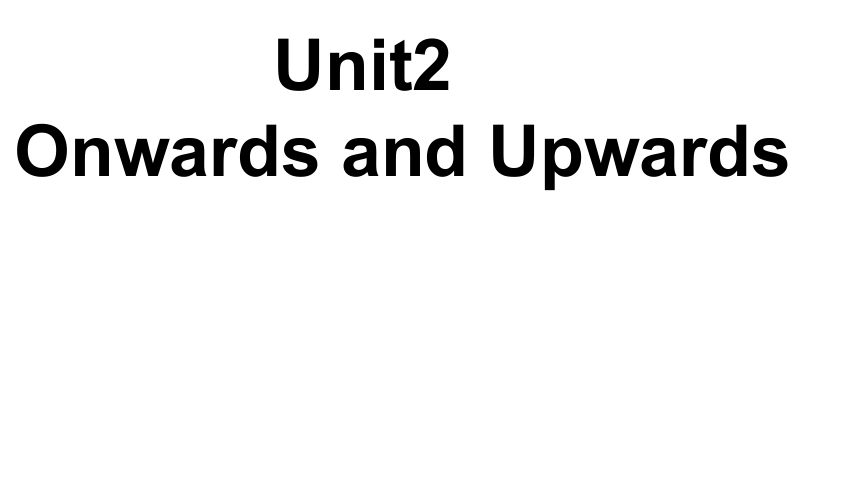 | |
| 格式 | ppt | ||
| 文件大小 | 5.2MB | ||
| 资源类型 | 教案 | ||
| 版本资源 | 外研版(2019) | ||
| 科目 | 英语 | ||
| 更新时间 | 2022-08-27 11:48:55 | ||
图片预览

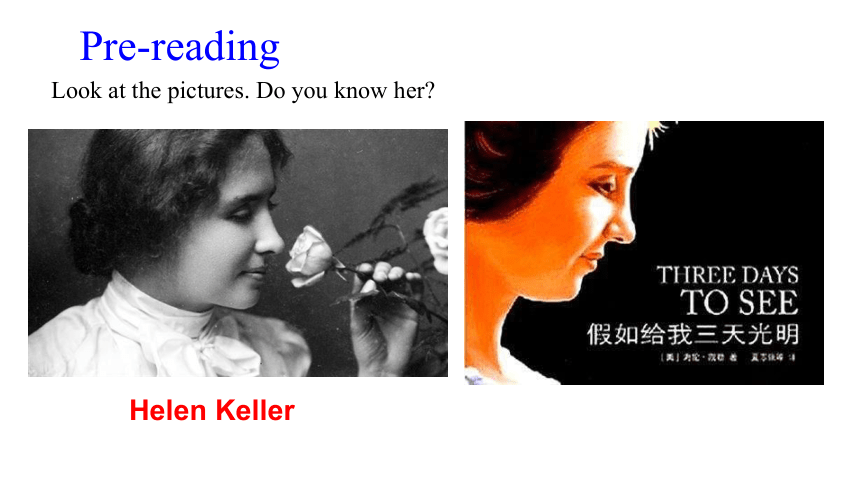

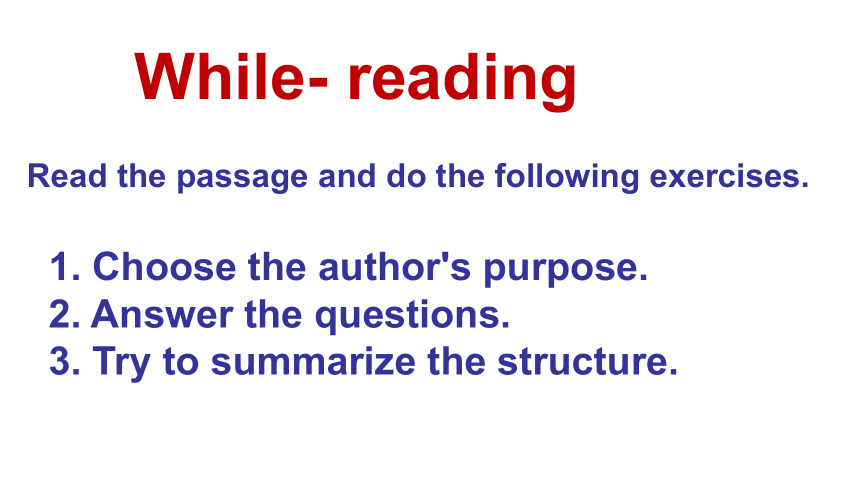
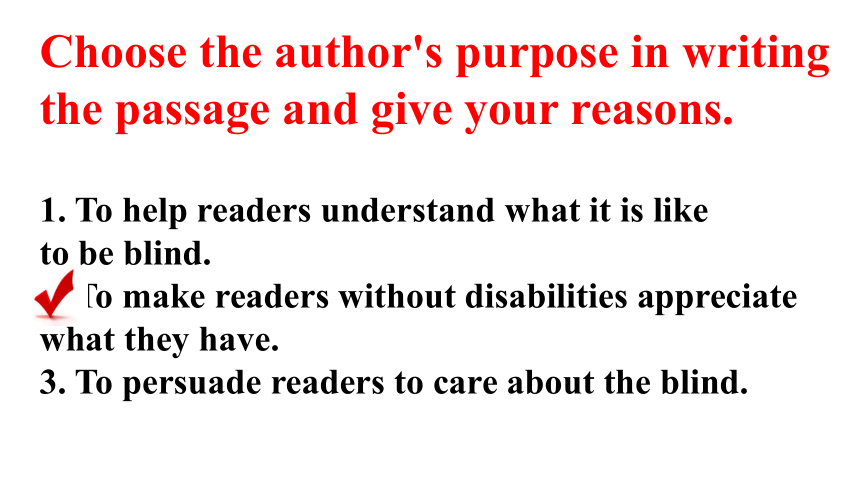
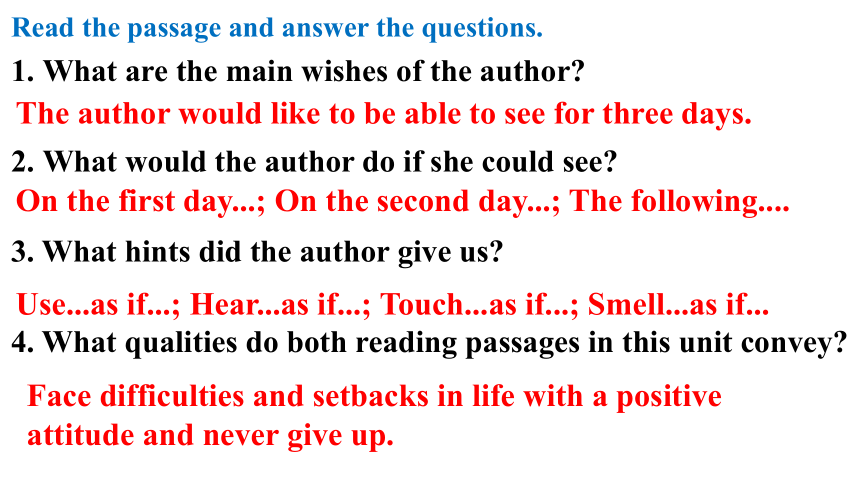
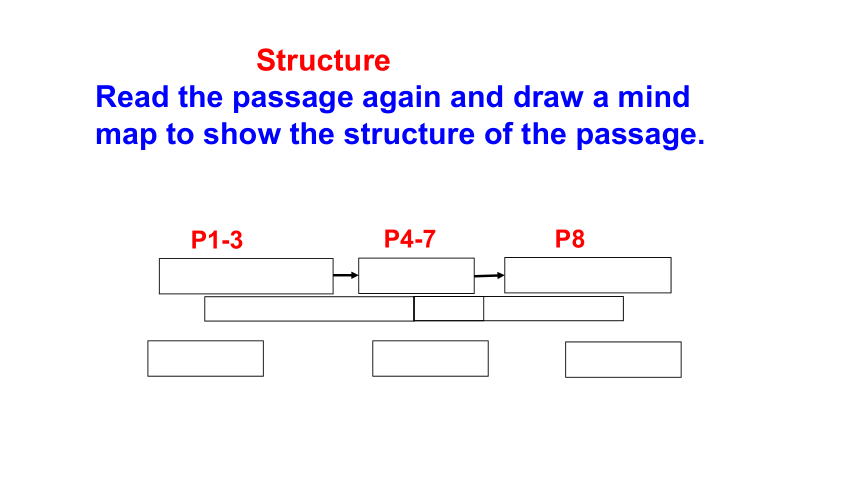
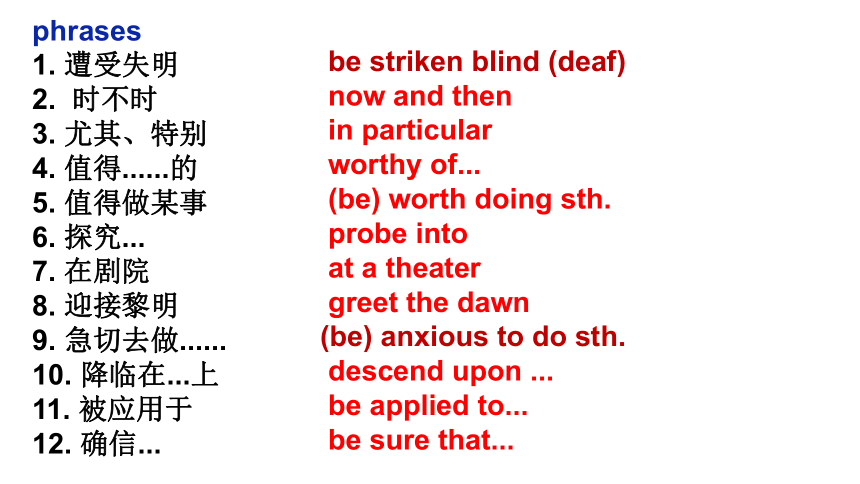

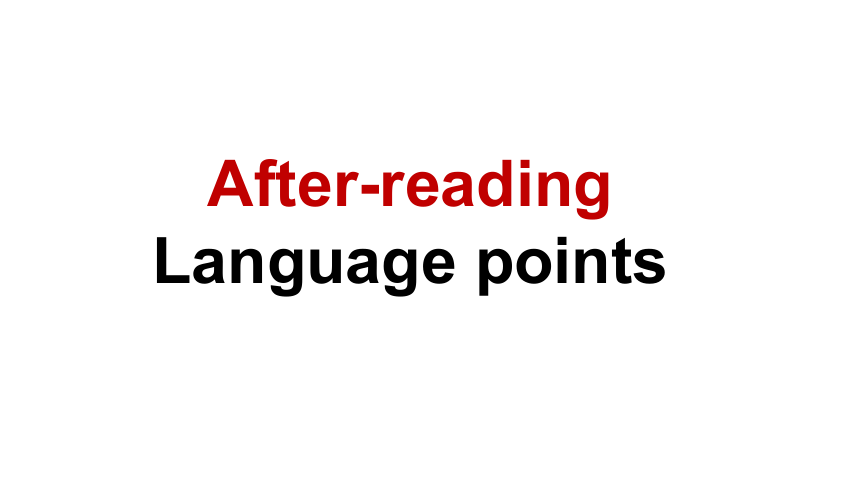
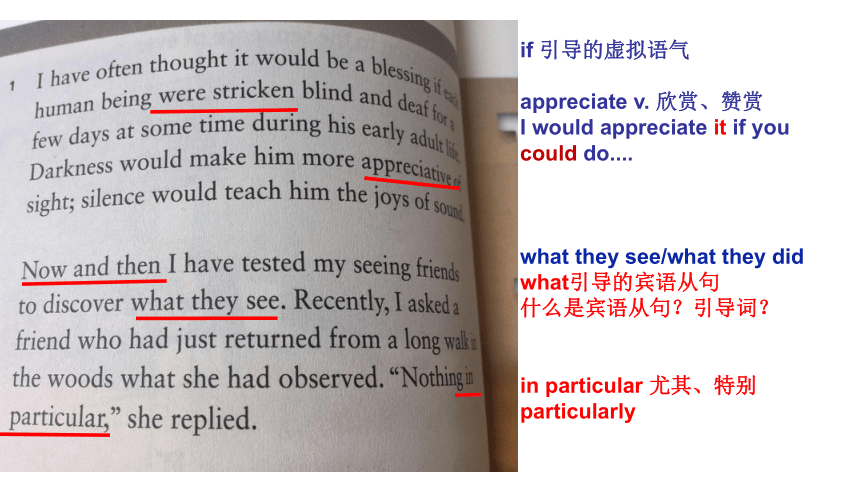
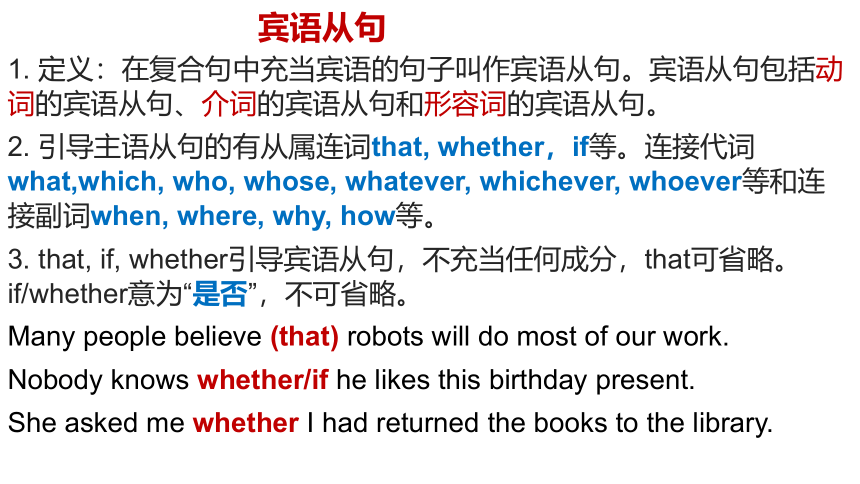
文档简介
(共39张PPT)
Unit2
Onwards and Upwards
Pre-reading
Look at the pictures. Do you know her
Helen Keller
While- reading
Read the passage and do the following exercises.
1. Choose the author's purpose.
2. Answer the questions.
3. Try to summarize the structure.
Choose the author's purpose in writing
the passage and give your reasons.
1. To help readers understand what it is like
to be blind.
2. To make readers without disabilities appreciate
what they have.
3. To persuade readers to care about the blind.
Read the passage and answer the questions.
1. What are the main wishes of the author
2. What would the author do if she could see
3. What hints did the author give us
4. What qualities do both reading passages in this unit convey
On the first day...; On the second day...; The following....
Use...as if...; Hear...as if...; Touch...as if...; Smell...as if...
The author would like to be able to see for three days.
Face difficulties and setbacks in life with a positive attitude and never give up.
Structure
Read the passage again and draw a mind map to show the structure of the passage.
P1-3
P4-7
P8
phrases
1. 遭受失明
2. 时不时
3. 尤其、特别
4. 值得......的
5. 值得做某事
6. 探究...
7. 在剧院
8. 迎接黎明
9. 急切去做......
10. 降临在...上
11. 被应用于
12. 确信...
be striken blind (deaf)
now and then
in particular
worthy of...
(be) worth doing sth.
probe into
at a theater
greet the dawn
(be) anxious to do sth.
descend upon ...
be applied to...
be sure that...
1.我常常思忖,如果每个人在青年时期都有一段时间看不见、听不见,那会是一件幸运的事情。
2.我想象过,如果我能被恩赐恢复视觉,哪怕只有三天,我最希望看到什么。
3.第一天,我想见几个人,他们用善良、温柔和陪伴让我觉得我有活下去的意义。
4.第三天清晨,我将再次迎接黎明,热切地去探索更多愉悦,发现更多美好。
5.唯有在黑暗再次来袭时,我才意识到我还有那么多事情没有看到。
6.要像明天就要惨遭失明之痛一样去使用你的眼睛。
7.同样的方法也能用于其他感官。
8.在所有的感觉中,我相信,视觉一定是最令人愉快的。
After-reading
Language points
if 引导的虚拟语气
appreciate v. 欣赏、赞赏
I would appreciate it if you could do....
what they see/what they did
what引导的宾语从句
什么是宾语从句?引导词?
in particular 尤其、特别
particularly
宾语从句
1. 定义:在复合句中充当宾语的句子叫作宾语从句。宾语从句包括动词的宾语从句、介词的宾语从句和形容词的宾语从句。
2. 引导主语从句的有从属连词that, whether,if等。连接代词what,which, who, whose, whatever, whichever, whoever等和连接副词when, where, why, how等。
3. that, if, whether引导宾语从句,不充当任何成分,that可省略。if/whether意为“是否”,不可省略。
Many people believe (that) robots will do most of our work.
Nobody knows whether/if he likes this birthday present.
She asked me whether I had returned the books to the library.
4. 只用whether不用if的情况
① 引导介词后的宾语从句
It depends on whether it will snow tommorrow.
② 与or not 连用
I want to know whether it's good news or not.
③ 与不定式连用
I can't decide whether to stay.
④ 宾语从句前置,置于句首时
Whether they can finish the work on time, we don't know.
5. 连接代词和连接副词引导宾语从句时,通常有实际意义,不可以省略。连接代词在从句中作主语、宾语、表语、定语等成分;连接副词作状语。
She asked me whose handwriting was the best in the class.
I will take whatever she gives me.
Do you know when the ancient games began
My uncle is the owner of a restaurant close to where I live.
Joe wanted to know who bought him the gift.
Whether we can succeed dependson how well we cooperate.
I could't follow what the teacher said.
worthy 值得尊敬的,值得赞赏的
worth/worthwhile
be worthy of +n. 值得...的
be worthy to do 值得被..
be worth+钱数 ...值多少钱
be worth doing sth.值得做...
.....be worthwhile....是值得的
It is worthwhile to do/doing...
做...是值得的
reveal v. 展现、揭示、揭露
revelation n. 展现、展示
if引导的虚拟语气,与现在
事实相反
怎么区别 be worth ;be worthy; be worthwhile
1.The book is __________20 yuan.(值)
2.The place is worth_______________(值得访问).
3.The news is (well)worth__________________ (注意).
4.The quention is worthy___________________(考虑).
The place is worthy of_______________ (访问)
The place is worthy _______________(访问)
______________(访问这座城市) is worthwhile.
______________(访问这座城市) is worthwhile.
worth
visiting
paying attention to
of consideration
= The questioon is worthy to be considered.
a visit
to be visited
To visit the city
Visiting the city
It is worthwhile to visit the city.
It is worthwhile visiting the city.
【要点归纳】虚拟语气在条件状语从句中的用法小结:
时态倒退原则
情况 从句谓语动词 主句谓语动词
表示与现在事实相反 did
were would/should/could/might+动词原形
表示与过去事实相反
had done would/should/could/might have done
表示与将来事实相反 did(be用were)
were to do sth.
should do sth. would/should/could/might+动词原形
与现在事实相反的虚拟语气
如果我现在有时间,我就去巴黎旅游。
If I had time, I would travel to Paris.
2. 如果我是你,我就会去帮助他.
If I were you, I would help him.
3. 如果我有足够的钱,我就会买一本英语参考书。
If I had enough money, I would buy an English reference
book.
4. 如果我是一只鸟,我就能够在天空中自由地飞翔了。
If I were a bird, I could fly in the sky freely.
从did/were; 主could/would/should/might do sth.
与过去事实相反的虚拟语气
如果你刚才认真听了,你或许已经知道发生什么事了。
If you had listened carefully, you might have known what
was going on.
2. 要是昨晚下雨的话,地面本应是湿的了。
If it had rained last night, the ground should have been wet.
3. 如果当时你听我的建议,你就会好多了。
If you had taken my advice, you would have been better now.
4. 假若我昨天对他说了,我本应知道该做什么了。
If I had spoken to him yesterday, I should have known what to do now.
从had done; 主could/would/should/might have done
与将来事实相反的虚拟语气
如果你将来成功了,一切都会好起来的。
If you succeeded in the future, everything would be all right.
2. 要是你父亲知道了,他会生气的。
If your father knew this, he would be angry.
3. 即使太阳从西边出,我对你的爱也不会变。。
If the sun were to rise in the west,my love for you would not change.
从did/were/were to do/should do;
主could/would/should/might do sth.
with的复合结构,with +n. + done
worth doing sth.
whose引导的定语从句,作定语,...的
get sth. done 请人做...
which引导的非限制性定语从句
使...陶醉于
非限制性定语从句
1. which 既可以指代先行词,也可以指代整个句子。
Until now, we have raised 50,000 pounds for the poor children, ______ is quite unexpected.
2. that不能引导定语从句
It is a truly delightful place, that looks the same as it must have done 100 years ago.
3. 已成为固定用法:as is known to all , as is often the case, as has been pointed out, as often happens, as...
The number of smokers, ______ is reported, has dropped by 17 percent in just one year.
4. 指代物of +which, 人of +whom
I had made many friends, two of ____ are still my best friends today.
which
which
as
whom
用合适的词填空
1. (2016全国卷III)Some people think that the great Chinese scholar Confucius, ________ lived from roughly 551 to 479B.C., influenced the development fo chopsticks.
2. (2015全国卷I)I ‘d skipped nearby Guilin, a dream place for tourists seeking the limestone mountain tops and dark waters of the Li River ________ are pictured by artists in so many Chinese paintings.
3. (2014全国卷I)Maybe you have a habit______ is driving your family crazy.
4. (2014广东)The next day, my brother and I went to the beach _______ we watched some people play volleyball.
who
which
which
where
1. 公寓离校园很近,这让我在30分钟内骑车到学校成为可能。
The apartment is near the campus, which makes it possible for me to go to school by bike within 30 minutes.
2. 我们参观了城市博物馆和一些名胜古迹,这让我对英国的社会、文化和历史由来更好的理解。
We visited the city museum and some places of interest, which made me have a better understanding of the English society, culture and history.
which用于作文
with的复合结构,with +n. + done
get sth. done 请人做...
探究
在剧院、在电影院
n. 展现、展示 reveal
n. 人们常去的地方
部分倒装句
as if 引导的虚拟语气
be sure that ... delighted
部分倒装句
如果把助动词或情态动词放于主语之前,称为部分倒装句。
1). So/Neither/Nor+助动词/情态动词/be+主语
表示一种情况适用于两者或一者同时具备两种情况。
He is a teacher. So am I .
She can swim. So can I.
I loved this movie and so did all my friends.
2) 表示否定意义的词如:not, never, hardly, seldom, scarcely, barely, little, no, nowhere, not only, not until, at no time, by no means, in no way等句首时…
在通常情况下,当表示否定意义的副词(如hardly, never, seldom, little, rarely等)被置于句首时,其后的句子用部分倒装的形式(与一般疑问句形式相同)。如:
Hardly had he arrived when she started complaining.
他刚到她就抱怨起来。
Little do they know about her alternative career.
他们对她的另一个职业一无所知。
Never before had he seen so many people starving.
以前他从未见过这么多人挨饿。
Rarely have I seen such a beautiful sunset.
我很少见到这样美丽的日落。
Seldom do we hear such fine singing from school choirs.
我们很少能听到学校的合唱团有如此好的歌唱了。
He hardly spoke a word.
=Hardly did he speak a word.
3. 当only+状语置于句首且修饰副词、介词短语或状语时:
Only when Lily walked into the office did she realize that
she had left the contract at home.
Only in this way can we solve the problem.
4. as\though 引导的让步状语从句
Try as she might , Sue couldn’t get the door open.
Unsatisfied though he was with the payment, he took the job.
尽管他是一个小孩子,但是他懂得很多。
Child as he is, he knows a lot.
(无冠词)名词/形容词/动词+as+主语+谓语...
写作中的倒装句
只有用这种方式我们才能开心地、有效率地学习。
Only in this way can we study happily and effectively.
2. We can help to construct an energy-saving society only
with joint efforts.
Only with joint efforts can we help to construct an energy-saving society.
3. The children can grow up mentally and physically healthy only in this way.
Only in this way can the children grow up mentally and physically healthy.
课本原句:Use your eyes as if tomorrow you would be stricken blind. And the same method can be applied to the other senses. Hear the music of voices, the song of a bird, the mighty strains of an orchestra, as if you would be stricken deaf tomorrow. Touch each object you want to touch as if tomorrow your tactile sense would fail. Smell the perfume of flowers, taste with relish each morsel, as if tomorrow you could never smell and taste again.
要像明天就要惨遭失明之痛一样去使用你的眼睛。同样的方法也能用于其他感官:要像明天就要惨遭失聪之痛一样,去仔细聆听音乐的旋律、鸟儿的歌唱、交响乐的震撼音符;要像明天就会触觉衰退一样,去触摸你想摸的每件物品;要像明天就会丧失嗅觉和味觉一样,去闻鲜花的芬香,品尝美味佳肴。
eg. It sounds as if it is raining.
It sounds as if it were raining.
She likes the boy as if he were her son.
as if
(与事实相近)
(与事实相反)
【要点归纳】as if从句虚拟语气用法小结:
谓语动词
表示与现在事实相反 用一般过去时, be动词常用were
表示与过去事实相反 用过去完成时had done
表示与将来事实相反 用would/could/might+动词原形
时态倒退原则
【语境运用】
1) She talks about Rome _________________________.
她说起罗马就像她亲自到过那里一样。
2He acts ______________________.
他做事像个傻子。
3) He opened his mouth __________________________.
他张开嘴好像要说什么。
as if he would say something
as if he were a fool
as if she had been there herself
Three Days to See
课文翻译
我常常思忖,如果每个人在青年时期都有一段时间看不见、听不见,那会是一件幸运的事情,因为黑暗会使人更加珍惜视力,静默能教会人享受声音的美妙。
我时常询问我那些看得见的朋友们,想了解他们看到了什么。最近,我问一个从林子里散步了许久回来的朋友观察到了什么,她答道:“没什么特别的。”
我问自己,在林子里散步一小时之久却没有看到任何值得注意的东西,这怎么可能呢?我一个看不见的人,仅仅通过触觉,就能发现成百上千件引起我兴趣的东西。如果仅仅通过触觉就能得到如此多的快乐,那么视觉能展现多少美好的事物啊。我想象过,如果我能被恩赐恢复视觉,哪怕只有三天,我最希望看到什么。
第一天,我想见几个人,他们用善良、温柔和陪伴让我觉得我有活下去的意义。我不知道通过“心灵的窗户”——眼睛来了解一个朋友是怎样一种体验。因为我只能通过我的指尖“看见”朋友的面部轮廓。我还要看书,那些别人读给我的书,那些为我揭示了人生和人类精神的深刻奥秘的书。到了下午,我要在树林中散步,让我的目光陶醉在大自然世界的美景中。这个夜晚,我夜不能寐。
第二天,我想看人类发展的奇观,我要去博物馆。我要通过人类的艺术探究人类的灵魂。那些之前通过触摸知晓的事物,我现在要亲眼看一看。而这一天的傍晚, 我要在剧院或电影院度过。
第三天清晨,我将再次迎接黎明,热切地去探索更多愉悦,发现更多美好。这天我将在平凡的世界里度过,在为生活奔波的人们常去的地方度过。
午夜,永恒的黑暗将再次把我笼罩。唯有在黑暗再次来袭时,我才意识到我还有那么多事情没有看到。
我,一个盲人,可以给那些看得见的人一个忠告:要像明天就要惨遭失明之痛一样去使用你的眼睛。同样的方法也能用于其他感官:要像明天就要惨遭失聪之痛一样,去仔细聆听音乐的旋律、鸟儿的歌唱、交响乐的震撼音符;要像明天就会触觉衰退一样,去触摸你想摸的每件物品;要像明天就会丧失嗅觉和味觉一样,去闻鲜花的芬香,品尝美味佳肴。但是,在所有的感觉中,我相信,视觉一定是最令人愉快的。
1.掌握课文重点内容 .
2. 做阅读题.
Unit2
Onwards and Upwards
Pre-reading
Look at the pictures. Do you know her
Helen Keller
While- reading
Read the passage and do the following exercises.
1. Choose the author's purpose.
2. Answer the questions.
3. Try to summarize the structure.
Choose the author's purpose in writing
the passage and give your reasons.
1. To help readers understand what it is like
to be blind.
2. To make readers without disabilities appreciate
what they have.
3. To persuade readers to care about the blind.
Read the passage and answer the questions.
1. What are the main wishes of the author
2. What would the author do if she could see
3. What hints did the author give us
4. What qualities do both reading passages in this unit convey
On the first day...; On the second day...; The following....
Use...as if...; Hear...as if...; Touch...as if...; Smell...as if...
The author would like to be able to see for three days.
Face difficulties and setbacks in life with a positive attitude and never give up.
Structure
Read the passage again and draw a mind map to show the structure of the passage.
P1-3
P4-7
P8
phrases
1. 遭受失明
2. 时不时
3. 尤其、特别
4. 值得......的
5. 值得做某事
6. 探究...
7. 在剧院
8. 迎接黎明
9. 急切去做......
10. 降临在...上
11. 被应用于
12. 确信...
be striken blind (deaf)
now and then
in particular
worthy of...
(be) worth doing sth.
probe into
at a theater
greet the dawn
(be) anxious to do sth.
descend upon ...
be applied to...
be sure that...
1.我常常思忖,如果每个人在青年时期都有一段时间看不见、听不见,那会是一件幸运的事情。
2.我想象过,如果我能被恩赐恢复视觉,哪怕只有三天,我最希望看到什么。
3.第一天,我想见几个人,他们用善良、温柔和陪伴让我觉得我有活下去的意义。
4.第三天清晨,我将再次迎接黎明,热切地去探索更多愉悦,发现更多美好。
5.唯有在黑暗再次来袭时,我才意识到我还有那么多事情没有看到。
6.要像明天就要惨遭失明之痛一样去使用你的眼睛。
7.同样的方法也能用于其他感官。
8.在所有的感觉中,我相信,视觉一定是最令人愉快的。
After-reading
Language points
if 引导的虚拟语气
appreciate v. 欣赏、赞赏
I would appreciate it if you could do....
what they see/what they did
what引导的宾语从句
什么是宾语从句?引导词?
in particular 尤其、特别
particularly
宾语从句
1. 定义:在复合句中充当宾语的句子叫作宾语从句。宾语从句包括动词的宾语从句、介词的宾语从句和形容词的宾语从句。
2. 引导主语从句的有从属连词that, whether,if等。连接代词what,which, who, whose, whatever, whichever, whoever等和连接副词when, where, why, how等。
3. that, if, whether引导宾语从句,不充当任何成分,that可省略。if/whether意为“是否”,不可省略。
Many people believe (that) robots will do most of our work.
Nobody knows whether/if he likes this birthday present.
She asked me whether I had returned the books to the library.
4. 只用whether不用if的情况
① 引导介词后的宾语从句
It depends on whether it will snow tommorrow.
② 与or not 连用
I want to know whether it's good news or not.
③ 与不定式连用
I can't decide whether to stay.
④ 宾语从句前置,置于句首时
Whether they can finish the work on time, we don't know.
5. 连接代词和连接副词引导宾语从句时,通常有实际意义,不可以省略。连接代词在从句中作主语、宾语、表语、定语等成分;连接副词作状语。
She asked me whose handwriting was the best in the class.
I will take whatever she gives me.
Do you know when the ancient games began
My uncle is the owner of a restaurant close to where I live.
Joe wanted to know who bought him the gift.
Whether we can succeed dependson how well we cooperate.
I could't follow what the teacher said.
worthy 值得尊敬的,值得赞赏的
worth/worthwhile
be worthy of +n. 值得...的
be worthy to do 值得被..
be worth+钱数 ...值多少钱
be worth doing sth.值得做...
.....be worthwhile....是值得的
It is worthwhile to do/doing...
做...是值得的
reveal v. 展现、揭示、揭露
revelation n. 展现、展示
if引导的虚拟语气,与现在
事实相反
怎么区别 be worth ;be worthy; be worthwhile
1.The book is __________20 yuan.(值)
2.The place is worth_______________(值得访问).
3.The news is (well)worth__________________ (注意).
4.The quention is worthy___________________(考虑).
The place is worthy of_______________ (访问)
The place is worthy _______________(访问)
______________(访问这座城市) is worthwhile.
______________(访问这座城市) is worthwhile.
worth
visiting
paying attention to
of consideration
= The questioon is worthy to be considered.
a visit
to be visited
To visit the city
Visiting the city
It is worthwhile to visit the city.
It is worthwhile visiting the city.
【要点归纳】虚拟语气在条件状语从句中的用法小结:
时态倒退原则
情况 从句谓语动词 主句谓语动词
表示与现在事实相反 did
were would/should/could/might+动词原形
表示与过去事实相反
had done would/should/could/might have done
表示与将来事实相反 did(be用were)
were to do sth.
should do sth. would/should/could/might+动词原形
与现在事实相反的虚拟语气
如果我现在有时间,我就去巴黎旅游。
If I had time, I would travel to Paris.
2. 如果我是你,我就会去帮助他.
If I were you, I would help him.
3. 如果我有足够的钱,我就会买一本英语参考书。
If I had enough money, I would buy an English reference
book.
4. 如果我是一只鸟,我就能够在天空中自由地飞翔了。
If I were a bird, I could fly in the sky freely.
从did/were; 主could/would/should/might do sth.
与过去事实相反的虚拟语气
如果你刚才认真听了,你或许已经知道发生什么事了。
If you had listened carefully, you might have known what
was going on.
2. 要是昨晚下雨的话,地面本应是湿的了。
If it had rained last night, the ground should have been wet.
3. 如果当时你听我的建议,你就会好多了。
If you had taken my advice, you would have been better now.
4. 假若我昨天对他说了,我本应知道该做什么了。
If I had spoken to him yesterday, I should have known what to do now.
从had done; 主could/would/should/might have done
与将来事实相反的虚拟语气
如果你将来成功了,一切都会好起来的。
If you succeeded in the future, everything would be all right.
2. 要是你父亲知道了,他会生气的。
If your father knew this, he would be angry.
3. 即使太阳从西边出,我对你的爱也不会变。。
If the sun were to rise in the west,my love for you would not change.
从did/were/were to do/should do;
主could/would/should/might do sth.
with的复合结构,with +n. + done
worth doing sth.
whose引导的定语从句,作定语,...的
get sth. done 请人做...
which引导的非限制性定语从句
使...陶醉于
非限制性定语从句
1. which 既可以指代先行词,也可以指代整个句子。
Until now, we have raised 50,000 pounds for the poor children, ______ is quite unexpected.
2. that不能引导定语从句
It is a truly delightful place, that looks the same as it must have done 100 years ago.
3. 已成为固定用法:as is known to all , as is often the case, as has been pointed out, as often happens, as...
The number of smokers, ______ is reported, has dropped by 17 percent in just one year.
4. 指代物of +which, 人of +whom
I had made many friends, two of ____ are still my best friends today.
which
which
as
whom
用合适的词填空
1. (2016全国卷III)Some people think that the great Chinese scholar Confucius, ________ lived from roughly 551 to 479B.C., influenced the development fo chopsticks.
2. (2015全国卷I)I ‘d skipped nearby Guilin, a dream place for tourists seeking the limestone mountain tops and dark waters of the Li River ________ are pictured by artists in so many Chinese paintings.
3. (2014全国卷I)Maybe you have a habit______ is driving your family crazy.
4. (2014广东)The next day, my brother and I went to the beach _______ we watched some people play volleyball.
who
which
which
where
1. 公寓离校园很近,这让我在30分钟内骑车到学校成为可能。
The apartment is near the campus, which makes it possible for me to go to school by bike within 30 minutes.
2. 我们参观了城市博物馆和一些名胜古迹,这让我对英国的社会、文化和历史由来更好的理解。
We visited the city museum and some places of interest, which made me have a better understanding of the English society, culture and history.
which用于作文
with的复合结构,with +n. + done
get sth. done 请人做...
探究
在剧院、在电影院
n. 展现、展示 reveal
n. 人们常去的地方
部分倒装句
as if 引导的虚拟语气
be sure that ... delighted
部分倒装句
如果把助动词或情态动词放于主语之前,称为部分倒装句。
1). So/Neither/Nor+助动词/情态动词/be+主语
表示一种情况适用于两者或一者同时具备两种情况。
He is a teacher. So am I .
She can swim. So can I.
I loved this movie and so did all my friends.
2) 表示否定意义的词如:not, never, hardly, seldom, scarcely, barely, little, no, nowhere, not only, not until, at no time, by no means, in no way等句首时…
在通常情况下,当表示否定意义的副词(如hardly, never, seldom, little, rarely等)被置于句首时,其后的句子用部分倒装的形式(与一般疑问句形式相同)。如:
Hardly had he arrived when she started complaining.
他刚到她就抱怨起来。
Little do they know about her alternative career.
他们对她的另一个职业一无所知。
Never before had he seen so many people starving.
以前他从未见过这么多人挨饿。
Rarely have I seen such a beautiful sunset.
我很少见到这样美丽的日落。
Seldom do we hear such fine singing from school choirs.
我们很少能听到学校的合唱团有如此好的歌唱了。
He hardly spoke a word.
=Hardly did he speak a word.
3. 当only+状语置于句首且修饰副词、介词短语或状语时:
Only when Lily walked into the office did she realize that
she had left the contract at home.
Only in this way can we solve the problem.
4. as\though 引导的让步状语从句
Try as she might , Sue couldn’t get the door open.
Unsatisfied though he was with the payment, he took the job.
尽管他是一个小孩子,但是他懂得很多。
Child as he is, he knows a lot.
(无冠词)名词/形容词/动词+as+主语+谓语...
写作中的倒装句
只有用这种方式我们才能开心地、有效率地学习。
Only in this way can we study happily and effectively.
2. We can help to construct an energy-saving society only
with joint efforts.
Only with joint efforts can we help to construct an energy-saving society.
3. The children can grow up mentally and physically healthy only in this way.
Only in this way can the children grow up mentally and physically healthy.
课本原句:Use your eyes as if tomorrow you would be stricken blind. And the same method can be applied to the other senses. Hear the music of voices, the song of a bird, the mighty strains of an orchestra, as if you would be stricken deaf tomorrow. Touch each object you want to touch as if tomorrow your tactile sense would fail. Smell the perfume of flowers, taste with relish each morsel, as if tomorrow you could never smell and taste again.
要像明天就要惨遭失明之痛一样去使用你的眼睛。同样的方法也能用于其他感官:要像明天就要惨遭失聪之痛一样,去仔细聆听音乐的旋律、鸟儿的歌唱、交响乐的震撼音符;要像明天就会触觉衰退一样,去触摸你想摸的每件物品;要像明天就会丧失嗅觉和味觉一样,去闻鲜花的芬香,品尝美味佳肴。
eg. It sounds as if it is raining.
It sounds as if it were raining.
She likes the boy as if he were her son.
as if
(与事实相近)
(与事实相反)
【要点归纳】as if从句虚拟语气用法小结:
谓语动词
表示与现在事实相反 用一般过去时, be动词常用were
表示与过去事实相反 用过去完成时had done
表示与将来事实相反 用would/could/might+动词原形
时态倒退原则
【语境运用】
1) She talks about Rome _________________________.
她说起罗马就像她亲自到过那里一样。
2He acts ______________________.
他做事像个傻子。
3) He opened his mouth __________________________.
他张开嘴好像要说什么。
as if he would say something
as if he were a fool
as if she had been there herself
Three Days to See
课文翻译
我常常思忖,如果每个人在青年时期都有一段时间看不见、听不见,那会是一件幸运的事情,因为黑暗会使人更加珍惜视力,静默能教会人享受声音的美妙。
我时常询问我那些看得见的朋友们,想了解他们看到了什么。最近,我问一个从林子里散步了许久回来的朋友观察到了什么,她答道:“没什么特别的。”
我问自己,在林子里散步一小时之久却没有看到任何值得注意的东西,这怎么可能呢?我一个看不见的人,仅仅通过触觉,就能发现成百上千件引起我兴趣的东西。如果仅仅通过触觉就能得到如此多的快乐,那么视觉能展现多少美好的事物啊。我想象过,如果我能被恩赐恢复视觉,哪怕只有三天,我最希望看到什么。
第一天,我想见几个人,他们用善良、温柔和陪伴让我觉得我有活下去的意义。我不知道通过“心灵的窗户”——眼睛来了解一个朋友是怎样一种体验。因为我只能通过我的指尖“看见”朋友的面部轮廓。我还要看书,那些别人读给我的书,那些为我揭示了人生和人类精神的深刻奥秘的书。到了下午,我要在树林中散步,让我的目光陶醉在大自然世界的美景中。这个夜晚,我夜不能寐。
第二天,我想看人类发展的奇观,我要去博物馆。我要通过人类的艺术探究人类的灵魂。那些之前通过触摸知晓的事物,我现在要亲眼看一看。而这一天的傍晚, 我要在剧院或电影院度过。
第三天清晨,我将再次迎接黎明,热切地去探索更多愉悦,发现更多美好。这天我将在平凡的世界里度过,在为生活奔波的人们常去的地方度过。
午夜,永恒的黑暗将再次把我笼罩。唯有在黑暗再次来袭时,我才意识到我还有那么多事情没有看到。
我,一个盲人,可以给那些看得见的人一个忠告:要像明天就要惨遭失明之痛一样去使用你的眼睛。同样的方法也能用于其他感官:要像明天就要惨遭失聪之痛一样,去仔细聆听音乐的旋律、鸟儿的歌唱、交响乐的震撼音符;要像明天就会触觉衰退一样,去触摸你想摸的每件物品;要像明天就会丧失嗅觉和味觉一样,去闻鲜花的芬香,品尝美味佳肴。但是,在所有的感觉中,我相信,视觉一定是最令人愉快的。
1.掌握课文重点内容 .
2. 做阅读题.
